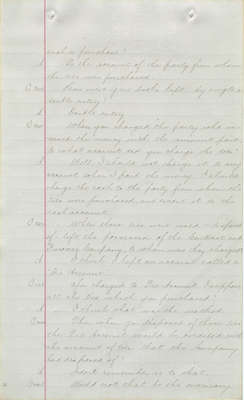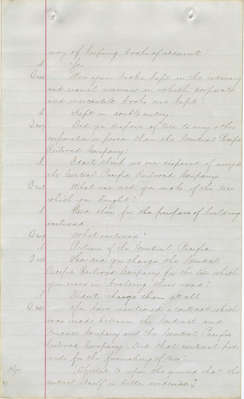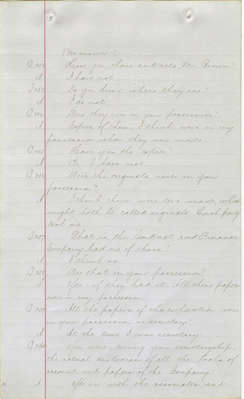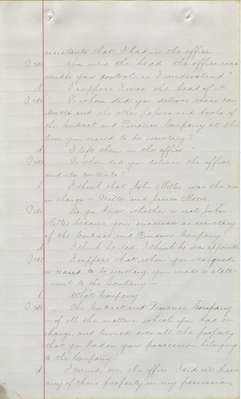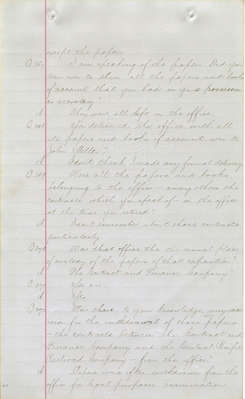Pages
Robinson_04241876__0203
such a purchase?
A. To the account of the party from whom the ties were purchased.
Q. 240 How were your books kept: by single or double entry?
A. Double entry.
Q. 241 When you charged the party who re= =ceived the money with the amount paid, to what account did you charge the ties?
A. Well, I should not charge it to any account when I paid the money. I should charge the cash to the party from whom the ties were purchased, and credit it to the cash account.
Q. 242 When those ties were used — disposed of — left the possession of the Contract and Finance Company, to whom were they charged?
A. I think I kept an account called a "Tie Account."
Q. 243 You charged to Tie Account, I suppose, all the ties which you purchased?
A. I think that was the method.
Q. 244 Then when you disposed of those ties the Tie Account would be credited with the amount of ties that the Company had disposed of?
A. I don't remember as to that.
Q. 245 Would not that be the ordinary
[bottom left margin:] 36
Robinson_04241876__0204
way of keeping books of account?
A. Yes.
Q. 246 Were your books kept in the ordinary and usual manner in which corporate and mercantile books are kept?
A. Kept in double entry.
Q. 247 Did you dispose of ties to any other corporation or person than the Central Pacific Railroad Company?
A. I don't think we ever disposed of any to the Central Pacific Railroad Company.
Q. 248 What use did you make of the ties which you bought?
A. Used them for the purpose of building railroad.
Q. 249 What railroad?
A. Portions of the Central Pacific.
Q. 250 How did you charge the Central Pacific Railroad Company for the ties which you used in building their road?
A. Didn't charge them at all.
Q. 251 You have mentioned a contract which was made between the Contract and Finance Company and the Central Pacific Railroad Company: Did that contract pro= =vide for the furnishing of ties?
[left margin:] Objn. [Objected to, upon the ground that the contract itself is better evidence.]
[bottom left margin:] 37
Robinson_04241876__0205
[No answer.]
Q. 252 Have you those contracts, Mr. Brown?
A. I have not.
Q. 253 Do you know where they are?
A. I do not.
Q. 254 Were they ever in your possession?
A. Copies of them, I think, were in my possession when they were made.
Q. 255 Have you the copies?
A. No; I have not.
Q. 256 Were the originals never in your possession?
A. I think there were two made, which might both be called originals. Each party took one.
Q. 257 That is, the Contract and Finance Company had one of those?
A. I think so.
Q. 258 Was that in your possession?
A. Yes: if they had it. All their papers were in my possession.
Q. 259 All the papers of the corporation were in your possession as secretary?
A. At the time I was secretary.
Q. 260 You were, during your secretaryship, the actual custodian of all the books of account and papers of the Company?
A. Yes sir: with the associates and
[bottom left margin:] 38
Robinson_04241876__0206
assistants that I had in the office.
Q. 261 You were the head: the office was under your control, as I understand?
A. I suppose I was the head of it.
Q. 262 To whom did you deliver these con= =tracts and the other papers and books of the Contract and Finance Company at the time you ceased to be secretary?
A. I left them in the office.
Q. 263 To whom did you deliver the office and its contents?
A. I think that John Miller was the one in charge — Miller and James Moore.
Q. 264 Do you know whether or not John Miller became your successor as secretary of the Contract and Finance Company?
A. I think he did: I think he was appointed.
Q. 265 I suppose that, when you resigned, or ceased to be secretary, you made a state= =ment to the Company —
A. What Company?
Q. 266 The Contract and Finance Company — of all the matters which you had in charge, and turned over all the property that you had in your possession belonging to the Company?
A. I turned over the office. I didn't have any of their property in my possession,
[bottom left margin:] 39
Robinson_04241876__0207
except the papers
Q. 267 I am speaking of the papers. Did you turn over to them all the papers and books of account that you had in your possession as secretary?
A. They were all left in the office.
Q. 268 You delivered the office, with all its papers and books of account, over to John Miller?
A. I don't think I made any formal delivery.
Q. 269 Were all the papers and books belonging to the office — among others the contracts which you speak of — in the office at the time you retired?
A. I don't remember about those contracts, particularly.
Q. 270 Was that office the the usual place of custody of the papers of that corporation?
A. The Contract and Finance Company?
Q. 271 Yes sir.
A. Yes.
Q. 272 Was there, to your knowledge, any occa= =sion for the withdrawal of those papers — the contracts between the Contract and Finance Company and the Central Pacific Railroad Company — from the office?
A. Papers were often withdrawn from the office for legal purposes: examination.
[bottom left margin:] 40
